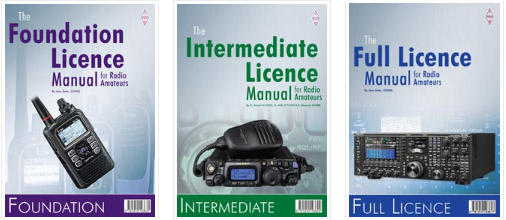In a recent post, I added a footnote talking about the competence requirements needed to obtain a full Falkland Islands amateur radio licence in the new licencing regime. I thought I would delve into it a little more.
 Photo credit: RSGB
Photo credit: RSGB
“In the new VP8 amateur radio licence Terms and Conditions, visiting radio amateurs applying for a Full Temporary licence MUST provide hard legal evidence of their competence in the form of the applicant’s home-country amateur radio licence as explained in the Guidelines:
“…documentary evidence of competence through a pass in a recognised
examination/certificate of competence or evidence of already having been issued a call sign in another jurisdiction.”While Falkland Island residents only need to sign a “self-declaration” of competence due to the lack of availability of formal technical exams which are mandatory in other countries.
This pragmatic approach currently represents a significant disincentive and challenge for any Falkland Islands’ resident who wishes to become a full radio amateur. Undergoing exams in other countries would be challenging enough for a knowledgeable adult let alone for a child younger than 15.”
Amateur radio needs technical knowledge and experience.
Let’s be straight about this. Obtaining a full amateur radio licence through self-certification is not a sensible or safe policy to implement anywhere. It may be acceptable for simple ‘citizen’s band’ low-power usage, but the technical knowledge of how to use higher power transmitters is paramount. The inappropriate use of these can cause incredible interference to public services such as terrestrial TV and also be quite dangerous from a safety perspective for themselves and others.
Video credit: RSGB
Use of VP8 licences outside of the Falkland Islands.
Another consequence of local Falkland islands’ residents (other than those that have UK or another country licence) who have NOT passed internationally recognised amateur radio technical exams, is that they are not allowed to operate in any other countries. They are not members of the international community of radio amateurs as generally accepted and defined by the International Telecommunications Union (ITU) whose standards the licence purports to support.
This is a significant disincentive for Falkland Islands’ amateur radio wannabes and a sad state of affairs for the hobby on the islands. Why should this be an acceptable situation, and how can this situation be corrected?
The need for local amateur radio qualifications.
The limitations of “self-certification” has been acknowledged with the following statement in the ” 4 Evidencing competence” section of the Guidance note – Full Amateur Station Licence issued by the Regulator:
“Full licences have been issued without evidence of competence for many years. However the requirement to show competence in the ITU Radio Regulations places a responsibility on administrations. The intention over time is for the Falkland Islands to move towards a qualification based competency for the full amateur licence to ensure the Falkland Islands meets its international obligations.”
The guidance also states:
“It is therefore an obligation on the Falkland Islands, as it is all ITU member states, to only let qualified persons operate an amateur radio station.”
Further:
“Until such a time that a process has been identified for an examination an age limit of 15 years will be introduced for the full amateur licence.”
Pragmatic intentions may be strictly legal in the short term, but what is not OK is to have this stated and nothing put in place to resolve the issue.
There is a path to achieving this (as there always has been) and it behoves Falkland Island stakeholders to be proactive in getting this implemented.
The path to proper amateur licencing.
Working with the RSGB is key to achieving this.
The Radio Society of Great Britain (RSGB) represents amateur radio operators in the United Kingdom and other counties, and I’ve been a member since I was a teenager. They provide support in cases of interference but more importantly, they organise exams, invigilation and training for all classes of amateur radio licence and actively encourage youngsters to take the exams to help keep the hobby alive.
A review of their web says much more than I can cover in this post, so I advise spending some time looking at their excellent web site. A ‘Getting started’ section can be found here.
Importantly, the RSGB are very happy to help the Falkland Islands implement adequate international training and examinations to encourage new members of our hobby.
The all-important HAREC scheme
A Harmonised Amateur Radio Examination Certificate (HAREC) is required for UK radio amateurs who would like to apply for an amateur radio licence in another country that participates in CEPT Recommendation T/R 61-02.
CEPT
“Member Nations of the European Conference of Postal and Telecommunications Administrations (CEPT) all share the same amateur radio reciprocal licensing requirements. Amateurs are permitted to operate from most European countries without the requirement of obtaining additional licensees or permits.”
HAREC
“The Recommendation makes it possible for CEPT administrations to issue a Harmonised Amateur Radio Examination Certificate (HAREC). The HAREC document shows proof of successfully passing an amateur radio examination which complies with the Examination Syllabus for the HAREC. It facilitates the issuing of an individual licence to radio amateurs who stay in a country for a longer term than that mentioned in CEPT Recommendation T/R 61-01. It also facilitates the issuing of an individual licence to a radio amateur returning to his native country showing the HAREC certificate issued by a foreign Administration.”
Radio Society of Great Britain (RSGB)
“Following discussions with Ofcom, the RSGB has agreed to issue a UK HAREC certificate alongside every new UK advanced examination pass certificate from 5 Sept 2016.
This may all seem to be a ‘bit technical’, but CEPT and HAREC will allow Falkland Islands’ radio amateurs to operate in other countries if they do not have a licence obtained in that country.
Most importantly, I understand that the RSGB is prepared to include Falkland Islands amateur radio Licences on their Internationally recognised CEPT/HAREC scheme, leaving almost nothing to be done here but include a clause in the new ordinance and print ‘HAREC Compliant’ on the Licences.
Note: the Recommendation T/R 61-02 provides the Examination Syllabus required for this to happen.
RSGB Amateur radio technical training
Moreover, we’ve been assured by the RSGB that they are also happy to extend the availability of all their training materials to the islands if so required.
On the training pages of the RSGB web site can be found everything a student needs to know about what is required to undertake amateur radio exams – training manuals, mock exam papers, exam forms and syllabus.
 RSGB training manuals
RSGB training manuals
Moreover, with the advent of the Covid-19 virus, the RSGB has been trialling their own remote exam invigilation service with considerable success:
“We have just completed some experiments to test the feasibility of providing our own remote invigilation service in conjunction with the TestReach application which have been using online for over two years. We tested the process rigorously, including setting people the challenge of trying to cheat and of moving out of the TestReach application to access other applications on the desktop. None of these attempts were successful.
Based on the success of those experiments, we are pleased to offer remote invigilation for online examinations and the Exam Department will be ready to receive online bookings from 6 April. Initially this will be for Foundation only… Our focus now is to enable new people to join amateur radio during these challenging times. However, in due course we will consider extending it to the other licence levels and allowing remote invigilation by club invigilators.”
June 26th 2020 RSGB press release:
“The online remote invigilation of the UK Foundation amateur radio exam continues to be extremely popular, with over 800 successful candidates so far, and more than 650 already booked for future Foundation exams.”
Availability of a local training centre in the Falkland Islands
We’ve been assured that the RSGB ‘would be more than happy’ to recognise the accredited Falkland Islands Stanley Training Centre as an official facility to undertake RSGB Radio Amateur Examinations (RAE). This represents a key milestone if this can be made to happen.
All that is required is for an appropriate individual in the Stanley Training Centre to formally request the RSGB to agree to start running a course for a Foundation License as a start. If this exam is passed, the successful applicant will be able to apply for a UK amateur radio licence together with a local VP8xxx one!
Of course, volunteers would be required to provide the training of course, which is the real challenge. Maybe staff at MPA could help with this?
What to do in the meantime?
There are other facilities in the UK for undertaking remote training for amateur radio examinations – one Essex HAM and at least one Falkland Islands’ resident has successfully taken an exam with this club. Use Google to search.
Conclusions
Amateur radio is a fantastic hobby enabling communication around the world, and Falkland Islands residents should be able to take exams locally and obtain a licence that is entirely in line with those obtained in other countries.
To quote from the RSGB site:
“What sort of people become radio amateurs?
Amateur Radio is the original high technology “social network”. Today it is regarded as a “broad church” and numbers in its ranks Kings, pop stars, public figures, the retired, schoolchildren and those at work or unemployed.
Whatever your interest in radio communications, you will find others sharing that interest — from “geeky” experimenters to those just interested in communicating by radio. So as a radio amateur, you simply do not know who you might talk to “over the air”. Using call signs as identifiers, there is no status on the air, and you talk, equal to equal, to everyone you contact.”
I would encourage all parties to work together to find a way forward that would enable training to take place locally. This training is both fun and rewarding for both trainers and students and the current overly pragmatic licence that allows self-certification to avoid the issue of exams just does not cut the mustard.
More VP8 activity on the HF amateur bands would be welcomed around the world I’m sure, so I would recommend that going for an accredited exam from the very beginning is the right start for a satisfying lifetime hobby.
How can I help?
Chris G3WOS, VP8WOS etc.
I hold a vp8 callsign as well as being a g0. How can I find my vp8 callsign as I have forgotten it? Would I then be able to use it in the UK?
G0wpb